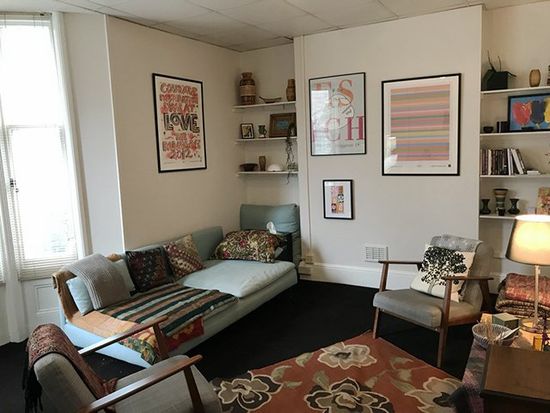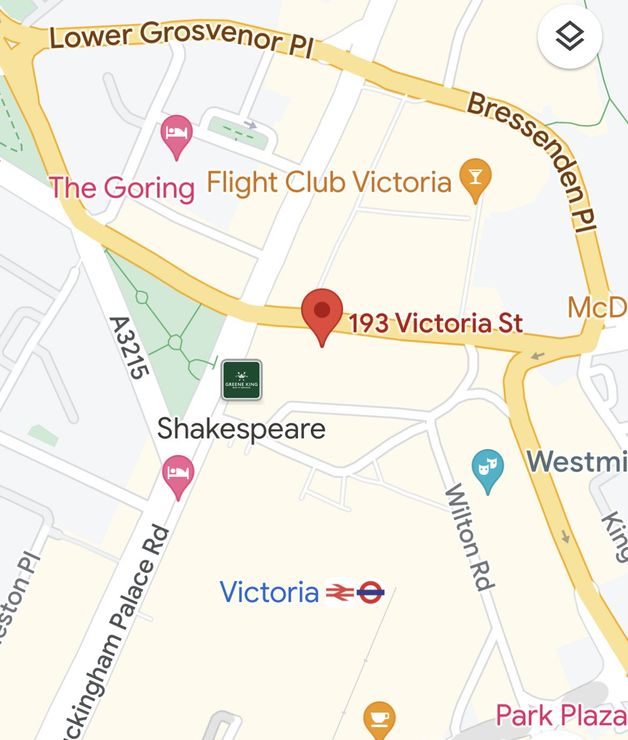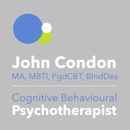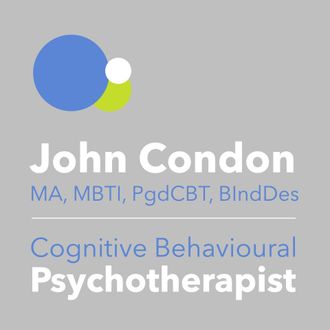Empowering you with CBT tools to achieve lasting change
Face to Face In Victoria, London Fields, & Virtual Sessions
Your Path To A More Fulfilling Life
Hello there, I'm John
I am a CBT Psychotherapist, and I've been helping clients meet their goals since 2006. My experienced and empathetic approach is based upon listening and responding to you carefully, reliably, and without prejudice. In CBT we identify, and reshape, your negative or inaccurate thinking habits. We can work through issues, thoughts, feelings, relationships and situations at home and/or in work, giving you new perspectives and skills to cope and to thrive. You can get in touch by clicking on the button below, and I look forward to hearing from you.
Client Review, Elsie R: "I had CBT sessions with John when I was really struggling, and in the first hour he’d totally changed my mindset, given me a healthier, more useful perspective and tools that I will use throughout life and won’t forget. He totally showed me what’s possible with CBT. John is incredibly kind, patient and non-judgemental and I would recommend him to anyone who needs some support."
What is CBT, and what can I help you with?
When we feel low or anxious, we tend to think in ways that make us feel worse. Negative thoughts do not always reflect reality, but when a person is low or anxious or depressed, they believe these thoughts to be true. CBT will help you to examine your thoughts more effectively and objectively, to manage your negative feelings, and to help you to identify and modify any self-defeating behavioural problems.
CBT is well renowned for providing some key benefits:
- It helps clients develop healthier thought patterns by becoming aware of the negative (and quite often unrealistic) thoughts that lower feelings and moods
- It is an effective short-term treatment option - improvements can often be seen in between five to twenty therapy sessions
- It is effective for a wide variety of maladaptive/unhelpful behaviours.
- It is often quite affordable, and I offer prepayment discounts
- Therapy can be effective both in-person, and online
- It can be accessed by those who don't require psychotropic medication
In this video, which is also on my YouTube Channel -- I talk about the CBT approach, giving you some tips:
The National Institute for Clinical Excellence (NICE) issues guidelines for the treatment and care of people with depression and anxiety and sets National Standards for care for people with depression and anxiety. NICE recommends CBT as THE psychological therapy for the treatment of Depression, Anxiety, and Addiction, and CBT is proven to help clients who want to look at areas such as:
Anxiety Related Issues:
- Anxiety, and related Panic Attacks (click to view brief introductory video)
- Stress and Overwhelm (click to view brief introductory video)
- Social Anxiety (click to view brief introductory video)
- Health Anxiety (click to view brief introductory video)
- Stress management / Work-Related Stress and Overwhelm (click to view brief introductory video)
- Phobias, including Claustrophobia and Cleithrophobia (click to view brief introductory video)
- Adjustment Disorder / Post Traumatic Stress Disorder (click to view brief introductory video)
- Accident-related Trauma / chronic pain or serious illness (click to view brief introductory video)
Depression Related Issues:
- Depression and Low Mood (click to view brief introductory video)
- Loss, or grief (click to view brief introductory video)
Behavioural Addictions:
- Gaming Addiction, Screen Addiction, Social Media Addiction (click to view brief introductory video)
Obsessive-Compulsive & Related Disorders:
- Obsessive-Compulsive Disorder (click to view brief introductory video)
Neurodevelopmental Conditions & Mental Health Impact:
- ADHD-related mental health issues (click to view brief introductory video)
Life Event & Related Issues:
- Divorce / relationship break-ups and family conflict (click to view brief introductory video)
- Low self-esteem and relationship problems (click to view brief introductory video)
- Emotions, moods, and life events related to the Covid-19 outbreak, lockdown, and post-viral health (click to view brief introductory video)
- Anger Management (click to view brief introductory video)
- Intrusive Thoughts (click to view brief introductory video)
- Insomnia (click to view brief introductory video)
I am experienced in helping you understand how thinking and behaviour influence your situation. We can also examine the effect of different systems - such as the family or work system - on your mood. I am aware that people's experience of the world and how the world experiences us can be influenced by diversity characteristics such a gender, sexuality, race, religion etc., and I work to establish a safe space for us to explore any aspects related to difference that you wish to address.
Client Review, Susan M: "I was struggling with a few issues when I was recommended to go and see John. He really listened to me. I went for approx 6 sessions of CBT which has changed my outlook completely. If I’m struggling in the future I will definitely go back to John again, it’s a great life line..."
UNDERSTANDING CBT
A Comprehensive Treatment Approach
Cognitive Behavioural Therapy represents a powerful, evidence-based therapeutic framework designed to help individuals focus on present thoughts and beliefs while developing practical strategies for lasting change. This structured psychological approach has demonstrated remarkable effectiveness across a wide spectrum of mental health conditions and life challenges.
Conditions Successfully Treated Through CBT
CBT provides effective treatment for numerous mental health conditions, including addiction, anger management issues, anxiety disorders, bipolar disorder, depression, eating disorders, panic attacks, personality disorders, and various phobias. The therapeutic approach extends beyond traditional mental health concerns to address significant life challenges such as chronic pain management, relationship difficulties, bereavement and loss, sleep disorders, self-esteem issues, and stress management.
Research consistently demonstrates that CBT offers particular strength in treating anxiety-related conditions, depression in both adults and young people, eating disorders where it serves as the leading evidence-based treatment, and substance use disorders through improved self-control and coping mechanism development.
Core Benefits and Treatment Advantages
The fundamental principle underlying CBT centres on the recognition that thoughts and feelings play a crucial role in shaping behaviour patterns. Through this understanding, individuals learn that while they cannot control every external circumstance, they can develop mastery over their interpretations and responses to environmental challenges.
CBT delivers several key therapeutic benefits. The approach helps develop healthier thought patterns by increasing awareness of negative and often unrealistic thinking that impacts mood and emotional wellbeing. Treatment typically requires between five to twenty sessions, making it an efficient short-term intervention option. The methodology proves effective across diverse behavioural challenges and often presents a more affordable alternative to other therapeutic approaches. Sessions can be conducted effectively through both face-to-face and online formats, and the approach works well for individuals who may not require medication-based interventions.
One of the most significant advantages lies in CBT's focus on developing practical coping strategies that remain useful throughout an individual's lifetime, extending benefits well beyond the therapeutic relationship.
Evidence Base and Clinical Effectiveness
CBT emerged during the 1960s through the pioneering work of psychiatrist Aaron Beck, who identified how specific thinking patterns contribute to emotional difficulties. Beck's concept of "automatic negative thoughts" formed the foundation for cognitive therapy development, shifting focus from behaviour modification alone to addressing the interconnection between thoughts, feelings, and behaviours.
Contemporary research establishes CBT as one of the most thoroughly studied therapeutic interventions. Clinical evidence demonstrates effectiveness across anxiety disorders, depression, eating disorders, insomnia, obsessive-compulsive disorder, panic disorder, post-traumatic stress disorder, and substance use disorders. The structured, goal-focused nature of CBT facilitates clear measurement of therapeutic outcomes, contributing to its strong research foundation and widespread clinical adoption.
Important Considerations for CBT Engagement
Several factors warrant consideration when engaging with cognitive behavioural therapy. Change processes can initially feel challenging, as recognising unhelpful thought patterns does not immediately translate to effortless modification. The structured nature of CBT may not suit those who find structured frameworks difficult to engage with.
Successful CBT outcomes require genuine commitment to examining thoughts and feelings through self-analysis, which can prove demanding but ultimately rewarding in terms of increased self-awareness and behavioural understanding. Progress typically occurs gradually through incremental steps toward behavioural change, requiring patience and sustained effort from participants.
Beginning Your CBT Journey
For individuals considering cognitive behavioural therapy, several practical steps facilitate effective treatment engagement. Initial consultation with qualified healthcare providers or certified CBT practitioners helps identify appropriate therapeutic matches.
Personal preferences regarding face-to-face versus online therapy delivery should be considered, and I am happy to see you in either setting. Approaching initial sessions with openness and commitment to identifying limiting thoughts and behaviours while learning forward-focused strategies creates the foundation for successful therapeutic outcomes.
What to Expect During CBT Sessions
Initial CBT sessions typically involve comprehensive assessment including background information, current symptoms, and therapeutic goals. We work collaboratively to increase awareness of unhelpful or unrealistic thoughts and beliefs, subsequently implementing strategies to develop healthier thinking and behaviour patterns.
Ongoing sessions focus on strategy implementation, progress evaluation, and approach refinement as needed. We will look to incorporate between-session techniques such as thought monitoring journals or skill practice exercises to reinforce therapeutic learning and accelerate progress toward individual goals.
The collaborative, structured approach ensures that each session builds systematically toward lasting positive change while providing practical tools for ongoing self-management and continued growth beyond the therapeutic relationship.
Client Review, Michael D: "John is a really knowledgeable and considerate therapist - I would highly recommend him."
Location & Fees
My consulting room is in 193 Victoria St, London SW1E 5NE, and I also work online if you would prefer.
We would start with a free introductory 10-15 minute chat. You can outline your challenges and I can offer some initial thoughts. I will then suggest how we might work together.
We then start our sessions with a diagnostic session; we take a look at your journey, and what you would like our work to focus on, and achieve. We will look at your thoughts and beliefs, and come to understand how they relate to your behaviours, feelings, and day-to-day functioning.

Sessions take 50 minutes - I work with you to develop new perspectives, thinking, and behaviours that enable you to address specific problems, more effectively. A typical session includes a review on work thus far, a check in on how you're doing, and how you are finding working with the model. We then undertake some further exercises, and conclude with an overview of what's been covered in the session, and setting the theme for the next session.
Personalised MBTI Assessment - Understand Yourself, Transform Your Life
Combining science-backed CBT with personality insights through MBTI assessment, I offer a uniquely personalised approach to therapy. Understanding your natural preferences helps us create more effective strategies for lasting change.
Key benefits include:
- Deeper Self-Understanding: MBTI provides insights into natural preferences and patterns, which complements CBT's focus on thought patterns and behaviors. This gives clients a more complete picture of themselves
- Tailored Treatment Approach: By understanding a client's personality type, we can customise CBT techniques to work with your natural tendencies rather than against them
- Career and Relationship Insights: MBTI is particularly valuable for clients dealing with career decisions or relationship challenges, as it helps you understand how you naturally interact with others and their environment
Session Length
Therapy can last between 7-20 sessions; we meet weekly, and the length of therapy depends on the nature of your problems and on your progress. I will discuss my treatment recommendations with you, and I will let you know how many sessions I think you will need to attend. When you feel ready to end therapy, we have a wrap-up session. If needed, we can also plan any follow-up appointments which usually take place at 3 / 6 month intervals.
If the nature of your issue might not suit the Cognitive Behavioural framework, we will explore options; I will suggest a suitable alternative, and refer you on. I can also refer you to a Psychiatrist, or to a specific assessor if necessary, as part of our working together.
Fees
My fees for face to face are £120 per each fifty minute session, and I invoice you at month-end. You can also prepay five sessions for £500.
Free initial consultation - The initial complimentary 15 minute consultation can either be face to face or online, this is a no-obligation meeting and is free of charge.
My Background
My therapeutic background includes both working for the NHS, and then in private practice, since 2006. I am a member of the British Association for Behavioural and Cognitive Psychotherapies (BABCP), and I am an Alumnus of the Tavistock Clinic in London. I'm originally from the South East of Ireland, and have been based in London for over 30 years.
Click on the button below to arrange your 15 minute consultation. You can tell me about your situation and what you're looking for, and we can think together about how I may be able help you.
My qualifications include:
- MA Systems-Psychodynamics - Tavistock Clinic
- PG Dip CBT - Postgraduate Diploma in CBT, Goldsmiths, University of London
- Advanced Systems-Psychodynamic Coach - Tavistock Clinic
- Myers-Briggs Type Indicator, Accredited Steps i and ii, 1:1/Groups Practitioner
- Rational Emotional Behavioural Therapy - Action Learning 1:1/Groups Practitioner
- Psychotherapeutic Approaches to Counselling - Birkbeck, University of London
- B.Ind.Des - University of Limerick
With my best wishes,
John

Contact details
Email MeTherapy Hours
- Monday
- Closed
- Tuesday
- -
- Wednesday
- -
- Thursday
- -
- Friday
- -
- Saturday
- Closed
- Sunday
- Closed
My Location:


